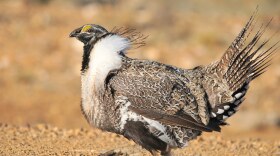-
The idea of a linear fuel break, or LFB, is pretty straightforward: by clearing grass or other fuel along fire-prone roads, or planting fire-resistant vegetation, you can slow the spread of wildfire. New research suggests they may save more money than they cost to install and maintain.
-
Last year, lawmakers turned to the Congressional Review Act to overturn Biden-era resources plans. Now, the tool is being looked at to unwind other public lands management actions.
-
Touren Pope discovered the fossil while rock hunting with his grandparents in southwest Wyoming. The turtle is now at the Tate Geological Museum in Casper.
-
The U.S. Forest Service announced revisions to its oil and gas leasing rules on Tuesday that the agency promises “modernizes and streamlines” the permitting process to drill for fossil fuels in the nation’s forests and grasslands.
-
The Department of the Interior (DOI) has formally announced the establishment of the U.S. Wildland Fire Service (USWFS), a development that came the same week that the U.S. Congress declined to fund it.
-
Federal land managers are reopening their environmental review of a massive transmission line proposed across Nevada, a move conservation groups say could reshape how energy infrastructure is approved on public lands across the West.
-
Oil and gas companies snatched up less than 1% of acres offered up in a bonus federal lease sale in Wyoming. But an industry group says that’s not for a lack of interest in drilling.
-
Conservationists say the plans for managing the declining species could push them closer to extinction.
-
New coal leasing will once again be allowed in the top producing region in the country. However, it’s unclear if the market is interested.
-
The BLM is holding an additional oil and gas lease sale this year in an unusual move. The status quo is four annual sales, one every quarter. This one is for parcels that haven’t received bids.
© 2026 Wyoming Public Media
800-729-5897 | 307-766-4240
Wyoming Public Media is a service of the University of Wyoming
800-729-5897 | 307-766-4240
Wyoming Public Media is a service of the University of Wyoming

Play Live Radio
Next Up:
0:00
0:00
Available On Air Stations












